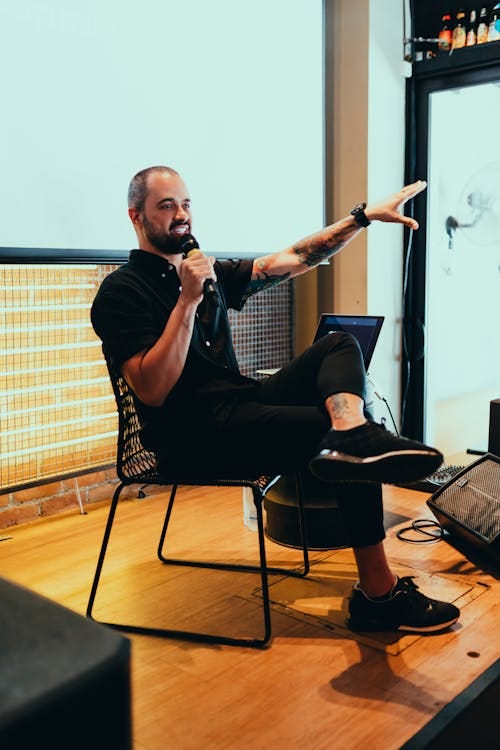Embracing the Unknown 2/2
Exclusive insights and lessons from top AI startup and tech speakers at the AI Startup School seminars.
I was granted exclusive online access to the AI Startup School seminars. Here are some awesome and very transforming things I learned from the top startup and tech speakers.
In order to read about my application to AI Startup School and my thoughts on entrepreneurship and risk, check out part I:
Embracing the Unknown 1/2: Applying to AI Startup School — Reflections

As I navigated my own journey, exploring my relationship with risk and entrepreneurship, I followed the AI Startup School seminar series each week. This transition—from introspective exploration to external insights—shifted both my setting and perspective. I discovered that my personal relationship with risk and uncertainty echoed the stories and lessons shared by the speaking entrepreneurs and innovators. The difference being they took the step into the unknown, armed with resilience and a thirst for knowledge.

I am not allowed to share the exact content of the seminar series, but I would like to convey the messages and thoughts that impacted me the most over the 9 lectures of this special EF talks.
All lectures took the form of interviews with the speaker(s). The speakers were a unique blend of famous figures in the AI startup scene, young entrepreneurs, and VC investors.
Key Takeaways from the AI Startup School Seminars
“Being in too early is the same as being wrong.” — Eiso Kant, Poolside

If the product you develop isn’t tailored to the public, or if the technology you invest in is too immature to add value, your venture is unlikely to succeed. Eiso Kant, CTO and co-founder of Poolside, shared insights from his experience in founding a startup focused on developing cognitive abilities through neural networks in 2016. Similarly, Arthur Mensch from Mistral AI highlighted the importance of capitalizing on opportunities at the opportune moment—neither too early nor too late. If the technology isn’t sufficiently mature, the business might struggle. It’s possible to choose the right technology but at an inopportune moment.

“The faster you acknowledge the lack of correlation between effort and impact, the faster it stops you complexes.” “Life is unfair, get over it.” — Matt Clifford, co-founder of Entrepreneur First
Matt Clifford, co-founder of Entrepreneur First, shared a wealth of knowledge about AI business models and the entrepreneurial spirit, as well as life in general. Having witnessed the rise and fall of many startups and invested in numerous ventures, he has gathered a trove of stories and insights. One of the most impactful statements was about acceptance—the acceptance of the fact that we don’t always get back what we give. Working tirelessly on a project does not guarantee success. Sometimes, factors like luck or intuition play a decisive role in a company’s fate.
The Role of Open Source in AI
The figures in the AI field, such as Emad Mostaque of Stability AI, Arthur Mensch of Mistral AI, and Karim Beguir of Instadeep, are strong supporters of open source. They see significant business opportunities in building around open-source models, with community engagement and customer acquisition being strong arguments in favor of this approach. Arthur Mensch believes in enhancing open-source business with exceptional customer service and thriving through partnerships. Karim Beguir finds great reward in community contributions to their work, which strengthens the product and unlocks business potential in scaling open source to meet client needs.
Stability AI’s business model involves providing access to advanced generative AI models through a subscription membership. This membership includes all available models, similar to Amazon Prime. This approach aims to make generative AI models predictable and easy to use. Additionally, the company offers consulting services for top organizations in need of expertise in generative AI. The goal is to revolutionize the industry by providing model base and support while adapting to the market’s growth.
Leading players in the AI space have varying perspectives on open vs. closed models. OpenAI initially started with open models but has become cautious due to concerns about misuse. Google is open in some areas but avoids open sourcing models. Meta embraces openness, especially in language models. Microsoft supports open AI but has a mixed approach. Amazon focuses more on infrastructure. Apple is very secretive about anything they make, with some rare exceptions. Smaller labs and Japanese companies are aggressively pursuing open models.
The balance between open and closed AI models is shifting, with more players recognizing the benefits of openness.
The Future of AI
Many speakers emphasized the shift towards ‘quality over quantity’ as an emerging trend. This could take the form of providing the best data to achieve better model performance, or a shift towards specialized models and swarms of models.
The importance of developing robust evaluation frameworks and corrective mechanisms was also a common theme. The significance of exploring multimodality and enhancing model inference capabilities beyond current paradigms should not be neglected.
Insights on the Entrepreneurial Journey
The speakers extensively discussed their journeys with business ideas and the people they collaborated with. A speaker highlighted that a ‘moment of audacity’ is essential for taking the leap into entrepreneurship.
Another important step is finding a co-founder. This person should be both your best friend and your challenger, offering support and constructive disagreement. It’s commonly recommended to seek a business partner with complementary skills. However, a few speakers mentioned they did not follow this advice, and it still worked out for them as they are complementary on a different level, even though they have similar hard skills.
To build a successful business, the right idea involves identifying a niche, such as industry-specific issues, novel technologies, or regulatory gaps. For instance, Mistral AI identified a gap in the AI startup landscape and aimed to expedite progress in foundational models.
They also advised against becoming too lazy in a stable job. The quicker you immerse yourself in entrepreneurship, the better.
Another vital skill mentioned was the need to rapidly obtain feedback. The speaker encouraged aspiring entrepreneurs to begin creating, even if the idea isn’t perfect, and to engage with potential customers for feedback. Prioritizing swift iteration over waiting for the perfect final product is crucial. An environment that facilitates rapid learning and exposure is key.
Additionally, the speakers underscored the importance of embracing failure and perseverance throughout the entrepreneurial journey. Cultivate and pursue your ambition, and think beyond traditional boundaries.
To elevate the culture of entrepreneurship, Matt Clifford recommended carefully studying successful individuals. Understand their decisions and learn from their mistakes. He argued that reading books is more beneficial than spending time on platforms like Twitter and watching short videos.
Lastly, investors can act as true partners and guides on the entrepreneurial path, with strategic partnerships and foundational funding serving as catalysts for change.
The Next Wave of Startups: What to Expect
Currently, the media sector holds great potential for impactful innovation. Entrepreneurs are encouraged to tackle problems that deeply concern them and focus on regulated industries where they can make significant contributions. Within the AI ecosystem, opportunities for value creation span from specialized